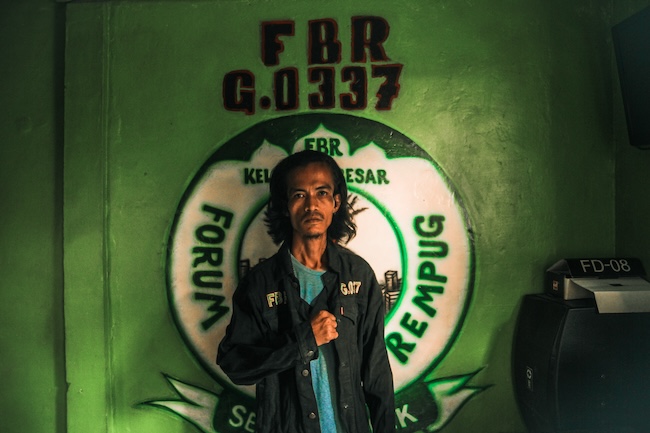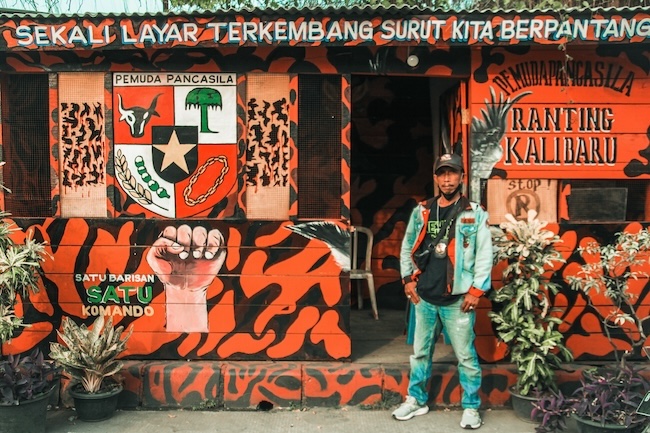Ahmad Tri Hawaari’s images highlight the long-standing urban form of the gardu or security post that can be found throughout many Indonesian cities.
One of the ubiquitous street signs throughout Java carries the instruction 'Tamu harap lapor'. This seemingly simple language construction is deceptively difficult to translate, but its implication is clear enough. Tamu (guests) are expected (or ‘hoped') to ‘report’. Report to whom? In many cases, it is implied that it is the local neighbourhood or RT/RW office. So-called tamu are then given the stipulation of doing so once a day during their stay. This security condition is a means of keeping track of outsiders (see the interview with Sana Jaffrey).
Reporting or ‘signing in’ is a means of ingratiating oneself with the local semi-formal security apparatus. It’s an opportunity for small talk over thick coffee, biscuits and cigarettes. The RT/RW system is the smallest scale level of governmental bureaucracy, and it plays a key role in managing everyday life in matters of family planning, health amenities and, of course, surveillance. From the security posts of the RT/RW citizens perform nightwatch duties and take strolls throughout kampungs to make sure everything is in order.
The writer Seno Gumira Ajidarma captures the condition of the nightwatch beautifully in his story, Penjaga Malam dan Tiang Listrik (The Nightwatchman and the Electricity Pole). Seno writes:
‘He also watches over the night, so that the night always becomes everything that the night enables. He watches over the night, so that the moon becomes everything that people imagine it to be, as they gaze up from earth. He always watches over the night, so that rats become the rats that creep out from drains, crawl l throughout markets and search for food in the darkness. That is the job of the nightwatchman: diligently watching over the dark night which verges on pitch-blackness, so that shadows can roam about; silently and stealthily.’
The Forum Betawi Rempug (FBR) have established their own network of ‘security posts’ throughout greater Jakarta (Jabotabek). These are known as gardu. The FBR gardu are almost uniformly bedecked with the portraits of the organisation’s founder Kyai Fadloli and their current leader, Kyai Luthfi Hakim. They also often feature the FBR’s logo as well as posters of their various activities or the FBR-oath in which their principles are outlined. Each FBR gardu has its own name and number to which FBR members are affiliated – information which is then detailed in their membership card.
The FBR are the basis for many of their activities: holding Thursday night Qur’anic study groups, the locations for celebrations such as the anniversary of Indonesia’s independence; the slaughtering of goats during Idul Adha, the collection of funds for orphanages. They are sites which seem to be predominated by male FBR members who seek to stay up to date with what is going on in their kampung. The Islamic orientation of FBR and their ‘provision of security services’ is arguably an indication of ‘sacralising security’.
Over recent years, owing to the intensification of conflict between FBR and Pemuda Pancasila in different parts of Jakarta, some security posts have been painted over in white, and denuded of their affiliating colours and symbols. Gardu and other forms of security posts, however, continue to proliferate and diversify throughout Jakarta. In an age of so much digital surveillance these remain a materialised version of analogue, face-to-face, in real-time surveillance – almost as relics of the past.
These photos by photographic journalist Ahmad Tri Hawaari capture some of the faces and forms of FBR’s material presence in Jakarta’s urban landscape.
Andy Fuller, November 2024







Ahmad Tri Hawaari is a photo journalist based in Jakarta. His Instagram account is @ahmadtrihawaari.












